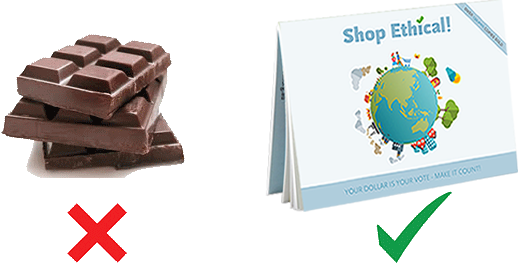
But what is the story behind those
chocolate bars?
- Child labour – The UN estimate about 300,000 children work as labourers in slave conditions on cocoa farms in West Africa, where more than 70 per cent of the world’s cocoa is grown. We don’t know where the cocoa in our chocolate comes from [more]
- Multinational ownership – The Big Three Nestlé, Mars and Cadbury/Mondelez, have all been criticised on workers rights. While they each now offer ethical alternatives and have made commitments to certify their whole range over time, they still have a way to go towards an exploitation-free supply-chain [more]
- Chocolate is high in sugar and fat.
Calorie overload! - Many chocolates contain palm oil [more]
Shop Ethical!
- A handy pocket-sized guide designed to help you match your shopping habits with your values and make an informed decision about where your money goes
- Get the low-down on the environmental and social record of companies behind common brand names in the supermarket
- Addresses issues such as food miles, palm oil, overfishing, child labour, genetic engineering, multinational ownership and packaging [more]
- Over 130,000 copies sold since 2008 [more]
Would you like to raise funds for your school, church or workplace while raising awareness about the issues connected to our everyday purchases?
Free display stands and promotional posters available.
* Upfront cost does not include postage
It works!
Instead of selling individually packaged questionable chocolates to fundraise for the McCrae SUFM program, this year we decided to order 80 copies of the Ethical Supermarket Shopping Guide to sell in our local churches. It didn’t take too long before they were all gone! And it’s done better than a fundraiser – people have really taken on board the ethical shopping challenge and I know of cases where favourite brands have been dismissed because of a poor rating in the guide.
The sales were helped along by getting a bit of air time to explain it in church, as well as a few weeks of themes around global justice to highlight the importance of our small decisions. We would highly recommend other groups to use this as a fundraising initiative.”
Brendan Petty
For some great resources for use in schools see Go ethical in your school.



